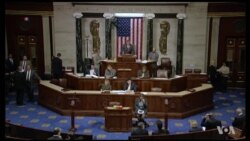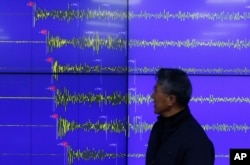U.S. House Republicans and Democrats joined together Tuesday to pass legislation that seeks to deny the Pyongyang government the hard currency it needs for its nuclear weapons program by imposing stronger sanctions.
The sanctions bill — called the North Korea Sanctions Enforcement Act — is seen as a response to North Korea's announcement last week that it had set off a hydrogen bomb, a thermonuclear weapon with potentially massive destructive power. That claim has been met with widespread skepticism as outside experts say North Korea actually conducted its fourth test of an atomic bomb, a less powerful nuclear weapon.
But those doubts didn't stop the House of Representatives from passing the sanctions bill by a whopping 418-2.
In debate leading up to the vote, Republican House Foreign Affairs Chairman Ed Royce, a Republican, said North Korea's fourth atomic test alone is enough to be of concern to the United States and its allies. Royce said the threat from North Korea's nuclear advances is unacceptable, and that Congress should take the lead.
"Importantly, what this bill does is use targeted financial and economic pressure to isolate [North Korean leader] Kim Jong Un and his top officials from the assets that they maintain in foreign banks and from the hard currency that sustains their rule," he said.
The North Korea Sanctions Enforcement Act would authorize the seizing of any assets connected with North Korea's proliferation, illicit activities and human rights violations. It would deny North Korean leaders access to the U.S. financial system, and it presses the president to sanction individuals who facilitate cyberattacks against the United States.
The U.N. Security Council, which met in an emergency session hours after the January 6 nuclear test was detected, is also considering new sanctions against North Korea for its "clear violation" of previous U.N. resolutions.
The council last approved sanctions against North Korea three weeks after Pyongyang's third nuclear test on February 12, 2013.
Royce and other Republicans said President Barack Obama's strategy of "strategic patience" with North Korea is not working, and conceded that several administrations have failed to stop the advance of that country's progress in developing nuclear weapons.
‘Reckless, paranoid state’
Democratic Representative Gerald Connolly said it is essential to always remember the human cost of the regime's expensive nuclear program to the starving people of North Korea.
"North Korea is a reckless, paranoid state devoid of virtually all aspects of human autonomy [and] now armed with a nuclear umbrella,” he said. “That makes the Korean peninsula one of the most dangerous flashpoints on the globe."
Connolly said the proposed sanctions bill provides an exception for humanitarian aid to North Korea.
The United States is the largest donor of humanitarian and food aid to the country.
Members of the Senate Foreign Relations Committee received a classified briefing late Monday on North Korea's most recent nuclear test.
Republican Committee Chair Bob Corker told VOA that the United States has, for a long time, continued to allow North Korea to make progress on its nuclear program.
Democratic Senator Tim Kaine told VOA that it is hard for the U.S. to have any influence on North Korea because it does not have diplomatic ties with Pyongyang. But he said Washington must demand that nations that do have close relations with North Korea, especially China, use their leverage to keep Pyongyang's nuclear ambitions in check.
It is not clear when the full Senate might take up a sanctions bill.
Beijing has criticized its key ally but has been reluctant to back severe sanctions that could cause instability along its border and spark further conflict.
Meanwhile, Washington and Seoul are in talks to move in more military assets — such as the B-52 nuclear-capable bomber that flew over South Korea Sunday in a show of force — to increase their defensive capability. There is also speculation a U.S. aircraft carrier could be sent into Korean waters.
But U.S. officials said there are no plans to station nuclear weapons in South Korea, a move that could alienate China and trigger a regional nuclear arms race.
Brian Padden in Seoul contributed to this report.






